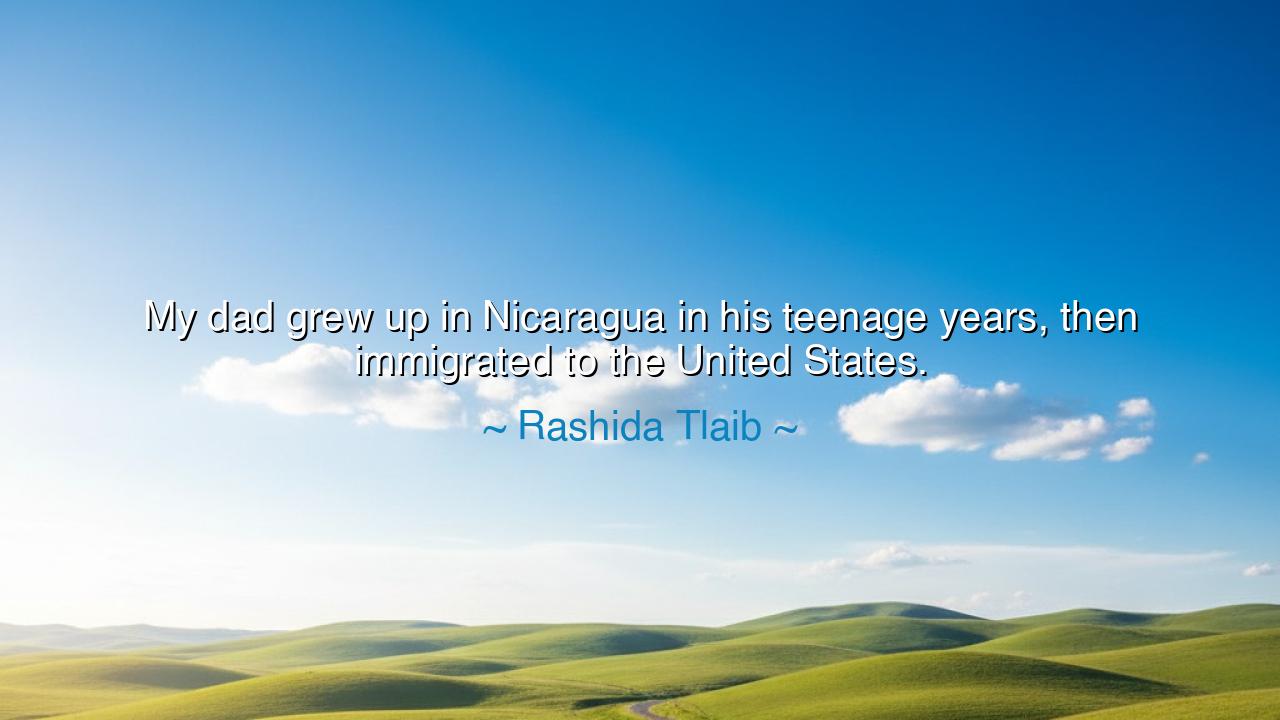
My dad grew up in Nicaragua in his teenage years, then immigrated
My dad grew up in Nicaragua in his teenage years, then immigrated to the United States.






Hearken, O seekers of wisdom, and attend to the words of Rashida Tlaib, a voice shaped by lineage and journey, who reflects: “My dad grew up in Nicaragua in his teenage years, then immigrated to the United States.” At first glance, these words may appear as a simple recounting of family history, yet beneath them lies a profound meditation on resilience, adaptation, and the forging of identity across lands and cultures. The ancients understood that the trajectory of one’s life is shaped as much by the journeys undertaken as by the place of origin, and that the trials of migration refine character and determination.
Tlaib begins with the principle of enduring courage in the face of upheaval. To leave one’s homeland is to confront uncertainty, risk, and loss; it is to sever roots while nurturing hope. In ancient times, the wandering of Aeneas from Troy to Italy illustrates this principle: exiled from home, he carried both grief and purpose, forging a new destiny upon foreign soil. Similarly, Tlaib’s father undertook the formidable journey from Nicaragua to the United States, embracing the unknown to secure opportunity and survival.
The essence of this wisdom lies in the shaping of identity through migration and adaptation. To live between worlds is to absorb the customs, languages, and values of multiple lands, creating a composite identity that is both resilient and enriched. Consider the Jewish exiles of Babylon, who preserved their traditions while adapting to new civilizations, producing cultural and intellectual achievements that spanned generations. Tlaib’s words remind us that our forebears’ journeys become the foundation upon which we build our own character and purpose.
Tlaib’s reflection also illuminates the moral courage of sacrifice for the future. Immigration is seldom a pursuit of ease; it entails leaving familiar bonds, enduring hardship, and striving against adversity. History provides many such examples: Frederick Douglass, born into bondage, escaped to claim freedom in a foreign land and dedicate himself to justice. The journey of Tlaib’s father, like these great predecessors, embodies the principle that the pursuit of opportunity and dignity demands courage, perseverance, and foresight.
The quote further underscores the transmission of values across generations. The struggles and choices of parents become lessons and legacies for their children. In ancient philosophy, the Stoics emphasized that wisdom is inherited not only in words, but in lived example—children observe resilience, determination, and moral courage in their parents. Tlaib’s acknowledgment of her father’s journey reflects the enduring impact of parental sacrifice, shaping both vision and ethos.
From this reflection emerges a practical teaching: honor the journeys and sacrifices of those who came before you, and recognize how their struggles have forged the opportunities of your own life. Draw inspiration from their courage, and allow it to inform your decisions, fortitude, and vision. Each act of resilience becomes a beacon for future generations, guiding them toward purpose and achievement.
Practically, this calls for reflection, gratitude, and deliberate emulation: study the paths of your forebears, acknowledge the hardships they endured, and integrate the virtues of perseverance, adaptability, and courage into your own life. Seek opportunities to honor their legacy through action, service, or personal growth, ensuring that the fruits of their labor continue to flourish.
Thus, let it be known: the journeys of our ancestors across lands and hardships are both foundation and inspiration for our own paths. Walk with awareness of their sacrifices, courage, and resilience, and let their stories guide your footsteps through the uncertainties of life. In this practice, heritage becomes both compass and strength, and the legacy of migration transforms into enduring wisdom and purpose.






AAdministratorAdministrator
Welcome, honored guests. Please leave a comment, we will respond soon